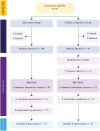Results of a Culturally Tailored Advance Care Planning Intervention for American Indian Peoples: A Quasi-Experimental Waitlist-Controlled Trial
- PMID: 40520470
- PMCID: PMC12166474
- DOI: 10.1093/geroni/igaf041
Results of a Culturally Tailored Advance Care Planning Intervention for American Indian Peoples: A Quasi-Experimental Waitlist-Controlled Trial
Abstract
Background and objectives: American Indian and Alaska Native peoples have disproportionately low rates of advance care planning (ACP). To address this problem, we culturally tailored and evaluated an intervention for ACP to the needs of a specific American Indian Tribe. The goal of our study was to examine the culturally tailored Make Your Wishes About You (MY WAY) ACP intervention with respect to 5 ACP outcomes: barriers, facilitators, readiness, self-efficacy, and notarized advance care plan completion.
Research design and methods: We engaged Tribal community members in a quasi-experimental, waitlist-controlled trial design to test the effects of the program. Our sample included 2, self-selected groups totaling 113 participants. Data were collected via interviewer-administered surveys with participants on 3 occasions. The intervention group completed an intervention baseline survey, postprogram survey, and a follow-up survey 6 months after the intervention, and the waitlist comparison group completed a control baseline survey, intervention baseline survey, and postprogram survey.
Results: Our results showed that, on average, ACP barriers decreased, and facilitators, readiness, self-efficacy, and notarized advance care plan completion increased postintervention for participants who completed the ACP program. These changes were significantly greater for the intervention group than the waitlist comparison group and were sustained at the 6-month follow-up for the intervention group. In total, 76 more individuals completed their notarized advance care plans by the end of program participation than at intervention baseline, a 79.1% increase.
Discussion and implications: The culturally tailored program was found to increase readiness and self-efficacy for ACP and increased the likelihood of a participant having a notarized advance care plan postprogram. Our study affects clinical and public health practice by testing a program that is responsive to cultural values, beliefs, and practices and shown to increase ACP among American Indian peoples.
Clinical trial registration: NCT05304117.
Keywords: Advance directive; Barriers and facilitators; End-of-life; Readiness; Self-efficacy.
© The Author(s) 2025. Published by Oxford University Press on behalf of the Gerontological Society of America.
Conflict of interest statement
None.
Figures
Similar articles
-
Testing a Culturally Tailored Advance Care Planning Intervention (MY WAY) for an American Indian Tribe: Protocol for a Quasi-Experimental Waitlist Control Design.JMIR Res Protoc. 2023 Dec 29;12:e50654. doi: 10.2196/50654. JMIR Res Protoc. 2023. PMID: 38157237 Free PMC article.
-
Cultural tailoring advance care planning for an American Indian community: make your wishes about you.Ethn Health. 2024 Nov;29(8):908-923. doi: 10.1080/13557858.2024.2401830. Epub 2024 Sep 18. Ethn Health. 2024. PMID: 39292977
-
Culturally Adapting an Advance Care Planning Communication Intervention With American Indian and Alaska Native People in Primary Care.J Transcult Nurs. 2020 Mar;31(2):178-187. doi: 10.1177/1043659619859055. Epub 2019 Jul 1. J Transcult Nurs. 2020. PMID: 31258037 Free PMC article.
-
Folic acid supplementation and malaria susceptibility and severity among people taking antifolate antimalarial drugs in endemic areas.Cochrane Database Syst Rev. 2022 Feb 1;2(2022):CD014217. doi: 10.1002/14651858.CD014217. Cochrane Database Syst Rev. 2022. PMID: 36321557 Free PMC article.
-
Advance care planning for adults with heart failure.Cochrane Database Syst Rev. 2020 Feb 27;2(2):CD013022. doi: 10.1002/14651858.CD013022.pub2. Cochrane Database Syst Rev. 2020. PMID: 32104908 Free PMC article.
References
-
- Anderson, E., Aldous, A., & Lupu, D. (2018). Make your wishes about you (MY WAY): Using motivational interviewing to foster advance care planning for patients with chronic kidney disease. Nephrology Nursing Journal, 45(5), 411–421. - PubMed
-
- Anderson, E., Twiggs, C., Goins, R. T., Astleford, N., & Winchester, B. (2022). Nephrology and palliative care providers’ beliefs in engaging American Indian patients in palliative care conversations. Journal of Palliative Medicine, 25(12), 1810–1817. https://doi.org/ 10.1089/jpm.2021.0612 - DOI - PubMed
-
- Arias, E., Tejada-Vera, B., Kochanek, K. D., & Ahmad, F. B. (2022). Provisional Life Expectancy Estimates for 2021. (23). https://doi.org/ 10.15620/cdc:118999. - DOI
-
- Carney, M. T., Williams, M., Zhang, M., Kozikowski, A., Dolgin, J., Kahn, A., Walerstein, S., Kessler, M., & Pekmezaris, R. (2021). Impact of a community health conversation upon advance care planning attitudes and preparation intentions. Gerontology & Geriatrics Education, 42(1), 82–95. https://doi.org/ 10.1080/02701960.2020.1739670 - DOI - PubMed
-
- Cooney, T. M., Shapiro, A., & Tate, C. E. (2019). End-of-life care planning: The importance of older adults’ marital status and gender. Journal of Palliative Medicine, 22(8), 902–907. https://doi.org/ 10.1089/jpm.2018.045 - DOI - PubMed
Associated data
LinkOut - more resources
Full Text Sources
Medical




